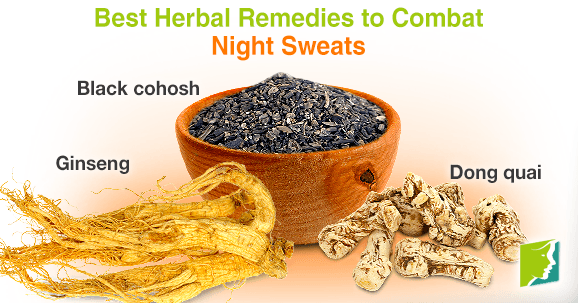Night sweats are one of the most common menopausal symptoms. You will often wake up, flushed and sweating, or shivering and chilled in the middle of the night. When a night sweat occurs during the day, it is considered a hot flash, and these two symptoms strike approximately 80% of menopausal women.
However, there is a host of herbal remedies that can help you beat night sweats. Herbal remedies can help you replace natural hormones, or soothe symptoms. Taken in conjunction with other lifestyle changes or strategies to reduce symptoms, they can be very effective.
The following is a list of some of the best herbal remedies and supplements to get rid of night sweats so you can sleep better.
Dong Quai
This is a perennial plant found in the mountains of Japan, China and Korea. Dong quai is commonly to treat gynecological problems, and has been referred to as the “female ginseng” because it has a variety of health benefits for women. Dong quai is full of phytoestrogens, so can it can increase estrogen levels, improve metabolic actions, and strengthen the immune system.
Black Cohosh
This flowering, phytoestrogenic plant grows in the woods of eastern North America, where it was used medicinally for centuries by Native American tribes. The word cohosh means “knobby rough roots.” It's well-known that black cohosh is beneficial for the female reproductive system, and can be used to treat menopausal symptoms, such as hot flashes, mood swings, depression, and irregular sleeping patterns.
Ginseng
A popular medicinal root in East Asia, Ginseng works in two ways: first, on a hormonal level. Phytoestrogenic hormones can simulate the effects of estrogen in the body, increasing dropping or fluctuating estrogen levels.
The second is via ginsenosides; a compound known to increase stamina and energy levels, and to improve the body's response to stress.
More Information
It's important to understand the causes and symptoms of night sweats so that you can understand how to treat them. Herbal remedies are a good option, but they are not the only option. You can also make various lifestyle changes, such as avoiding spicy foods before bed, or wearing cotton pajamas instead of ones made from synthetic fabrics.
If none of these remedies work, or you feel that your night sweats are significantly affecting your quality of life, talk to your doctor.
For more information on combating night sweats, click the link below.
Sources
- The National Institute of Health. (n.d),"Signs of the Menopausal Transition". Retrieved from www.nih.gov
- Boston Women's Health Collective. "Hot Flashes, Night Sweats and Sleep Disturbances". Our Bodies, Ourselves, 2006.
- Von Muhlen, DG, et al. "A community-based study of menopause symptoms and estrogen replacement in older women". Maturitas. Sept 1995; 22(2):71-8.




